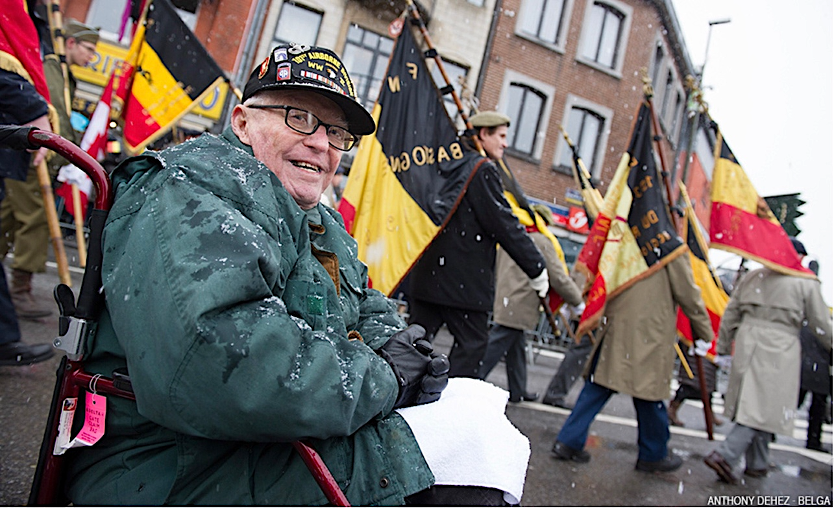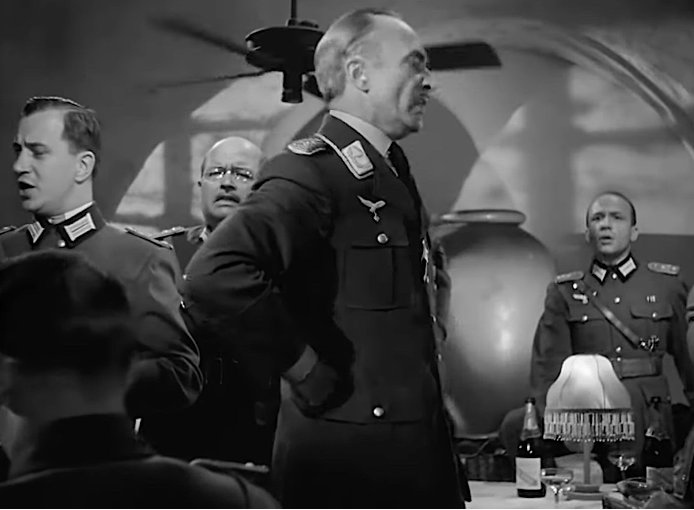“Casablanca” and The War

Recently, I was in my father’s garage, where I found a stack of old newspapers. One from 2014 contained an article about the commemoration of the 70th anniversary of the Battle of the Bulge in Bastogne, Belgium. The article I read had the photo by Anthony Dehez above depicting a group of men marching in a parade carrying flags. In the foreground, an elderly American veteran, warms his gloved hands as someone pushes his wheelchair forward. The veteran smiles at the camera, huddling in the cold and disregarding mobility issues, to take part in the parade. His presence in Belgium in 2014 repeats his bravery as a youth, called to face fear and danger in a foreign land, in order to liberate it. As I see it, the man made a tremendous effort for Europe at least twice in his lifetime. The photo is inspiring.
In December 1944, for almost six weeks, more than 600,000 U.S. soldiers fought a surprise German offensive against the Belgians in the freezing cold. Many of the men were already exhausted and hungry as they held back a terrible enemy. It became a great American victory, though the number of casualties was tremendous: 10,276 dead, 47,493 wounded, and 23,218 missing, according to the U.S. Army’s official history. The Battle of the Bulge was one of the bloodiest of World War II. It was also one of the most important because it stopped any other major German offensives. At the end of the battle, on 28 January 1945, Allied forces attacked Germany in unison, eventually leading to the Nazi surrender and the end of the war in Europe.1 Unlike many other soldiers, the veteran in the photo survived the ordeal of war. The thought of World War II for me is simply unimaginable. How could all that have happened? Americans selflessly rallied to aid Europeans, risking (and many losing) their lives in the process.
It suddenly reminds me of the “Marseillaise” scene in “Casablanca” (1942, starring Humphrey Bogart and Ingrid Bergman) at Rick’s Café. A small group of Nazis, led by Major Heinrich Strasser (Conrad Veidt), begin to sing “Die Wacht am Rhein,” a German patriotic hymn that emerged from centuries-old acrimony between Germany and France, and became popular at war time.2 As Victor Laszlo (Paul Henreid), a Czechoslovakian underground leader of the Resistance, hears the song, he rushes toward the band and demands that they play “La Marseillaise.”3 The musicians, reluctantly but loudly, begin playing the French national anthem. The trumpets first carry the tune, triumphantly. Immediately, everyone else at Rick’s joins in, completely drowning out the Nazis. The German song sounds amateurish and simplistic. In contrast, “La Marseillaise,” played by professional musicians is a rousing, inspiring tribute that extinguishes and overshadows the Teutonic theme. Major Strasser, with his arms akimbo, demonstrates his frustration at this development—he did not win this battle, which causes him to escalate his offensive.
In this scene, the Café’s inhabitants suddenly lose their fear of retribution against their oppressors and raise their voices. They gather their courage to stand symbolically against tyranny. In the film, most, if not all of them, are fleeing immigrants from many parts of Europe. And yet, they sing the French anthem in alliance, adopting it emblematically as their own.
It’s important to realize that the outcome of WWII was far from certain when “Casablanca” was filmed. Moreover, the U.S. had not yet entered the war at that point. And the menace merely symbolized by Major Strasser was actually a real one. It must have been a terrifying time in history. I can only try to imagine it and doubt it would come close to the real thing. At that time, tremendous bravery emerged in great numbers to save Europe. May God bless all these heroes. May they never be forgotten.
Copyright © 2024 by Rosi Prieto, Ph.D.
All Rights Reserved
https://en.wikipedia.org/wiki/Die_Wacht_am_Rhein
A clip of the film scene is found here:
Ironically, the code name for the German offensive leading to the Battle of the Bulge was called Unternehmen Wacht am Rhein ('Operation Watch on the Rhine'), after the patriotic hymn: https://en.wikipedia.org/wiki/Battle_of_the_Bulge
David Youngblood calls this “Cinema’s Greatest Scene”; I completely agree with him: https://seveninchesofyourtime.com/cinemas-greatest-scene-casablanca-and-la-marseillaise/



